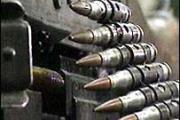

| HOME | HISTORY | ARTICLES | RESOURCES | DIRECTORY | SITE MAP |
|
Lords of War
“I hope they kill each other … too bad they both can’t lose.” — Nobel laureate Henry Kissinger (on the U.S. arming both sides of the Iran-Iraq war in the 1980s) “Do not support dictators. Do not sell them weapons.” – Nobel laureate Jose Ramos Horta, East Timorese peace negotiator It’s not every day Amnesty International asks me to go see a Nic Cage movie. So, when I got their e-mail about “Lord of War,” I promptly caught a bargain matinee at my local multiplex. This is not a movie review but, by Hollywood standards, “Lord of War” rates R for radical…and I was pleased to witness a film about the governments and freelancers supplying the weapons that kill men, women, and children every minute of every day. According to the Federation of American Scientists: Half of the world’s governments spend more on defense than health care. The U.S. share of total world military expenditures per year has been roughly 36 percent, while comprising under 5 percent of the world’s population. The U.S. Arms Industry is the second most heavily subsidized industry after 2001 world military expenditures topped $839 billion, while at the same The International Red Cross has estimated that one out of every two casualties of war is a civilian caught in the crossfire. The United Nations estimates there to be over 300,000 child soldiers around the world, now serving as combatants in over 30 current conflicts. The Center for International Policy estimates that around 80% of U.S. arms exports to the developing world go to non-democratic regimes. There are more landmines planted in Cambodia than people. Cambodia is just one of 64 countries around the world littered with some 100 million anti-personnel landmines. Intended primarily to maim, landmines can lie in wait years after a conflict ends, causing 500 deaths and injuries per week. The U.S. government is training soldiers in upwards of 70 countries at any given time. “Since the end of the Second World War, tens of millions of people have been killed by conventional weapons, mostly small arms such as rifles, machine guns and rocket-propelled grenade launchers,” reports Lowell Bergman of PBS’ Frontline. “Low-tech, handheld weapons and explosives do the vast majority of the killing today. There are more than 550 million small arms currently in circulation, many of them fueling bloody civil strife in countries from Sri Lanka to Sierra Leone.” And the home of the brave is the number one merchant of death. In 2004, the #2 and #3 weapons-exporting nations were France ($4.4 billion) and Russia ($4.6 billion). At #1 was the United States at $18.5 billion…and if that number alone isn’t enough to provoke action, consider where those weapons are going. “The U.S. has a long-standing (and accelerating) policy of arming, training, and aiding some of the world’s most repressive regimes,” says Frida Berrigan, Senior Research Associate with the Arms Trade Resource Center of the World Policy Institute. “The U.S. transferred weaponry to 18 of the 25 countries involved in active conflicts in 2003, the last year for which full Pentagon data is available.” I walked to the movie theater with no concern for landmines, snipers, or IEDs…but every foot that steps on a landmine somewhere in the Third World is blown off on our watch. If nothing else, “Lord of War” shines a much-needed light on this situation. Anyone can take issue over certain aspects of the film, but what the mediocre reviews this film is garnering knowingly ignore is the daily price of the arms trade and how Hollywood plays a role in fetishizing the use of such weapons. Governor Arnold once said, “I have a love interest in every one of my films—a gun.” I say, as a tiny first step, go see “Lord of War” instead of “The 40-year-old Virgin” this week and encourage others to do so. Do this not only to experience what Hollywood could do if it wanted but to vote with your movie dollar for a little less spectacle and a little more rabble-rousing at a theater near you. |
Copyright 2025 Boycottus.net All rights reserved.
|
 Arming the world at a theater near you
Arming the world at a theater near you